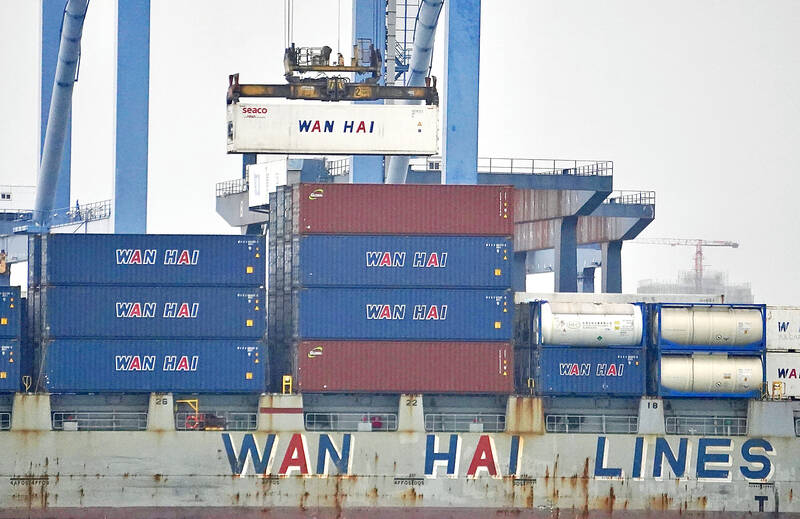The Taiwan Institute of Economic Research (TIER, 台灣經濟研究院) on Friday kept its forecast of Taiwan’s economic growth for this year at 3.15 percent, the same as its previous forecast in November last year on the back of stable consumer spending and investment.
However, the situation in the Middle East, the price of raw materials, the economic outlook in China, consumption momentum in the US and the monetary policies of major central banks would affect Taiwan’s trade and investment, the institute said at a forum on economic and industry trends.
Despite a decline in overseas orders, imports and exports for the first three quarters of last year, Taiwan could see a revival in external trade this year, the institute said, citing an expected global recovery in commerce and rising demand for semiconductors.

Photo: CNA
Taiwan’s exports and imports are forecast to grow at 6.34 percent and 7.68 percent respectively this year, 1.31 and 2.24 percentage points higher than its previous forecast, the institute said.
The semiconductor industry is expected to see a full recovery only in the second half of the year, due to the slow recovery of IC design and manufacturing, it said.
As for domestic demand, sales in the retail and hospitality industries reached new highs last year, an indication that private consumption momentum remains strong, despite price increase pressure in the service sector, it said.
The institute predicted annual growth of 1.95 percent in the consumer price index this year, up 0.15 percentage points compared with its previous forecast.
In addition, other surveys conducted by TIER have shown that workers in the manufacturing, service and construction industries have a positive view of the economy, which is also a sign of recovery, TIER Economic Forecasting Center director Gordon Sun (孫明德) said at the forum.

PATENTS: MediaTek Inc said it would not comment on ongoing legal cases, but does not expect the legal action by Huawei to affect its business operations Smartphone integrated chips designer MediaTek Inc (聯發科) on Friday said that a lawsuit filed by Chinese smartphone brand Huawei Technologies Co (華為) over alleged patent infringements would have little impact on its operations. In an announcement posted on the Taiwan Stock Exchange, MediaTek said that it would not comment on an ongoing legal case. However, the company said that Huawei’s legal action would have little impact on its operations. MediaTek’s statement came after China-based PRIP Research said on Thursday that Huawei filed a lawsuit with a Chinese district court claiming that MediaTek infringed on its patents. The infringement mentioned in the lawsuit likely involved

Taipei is today suspending work, classes and its US$2.4 trillion stock market as Typhoon Gaemi approaches Taiwan with strong winds and heavy rain. The nation is not conducting securities, currency or fixed income trading, statements from its stock and currency exchanges said. Authorities had yesterday issued a warning that the storm could affect people on land and canceled some ship crossings and domestic flights. Taiwan Semiconductor Manufacturing Co (TSMC, 台積電) expects its local chipmaking fabs to maintain normal production, the company said in an e-mailed statement. The main chipmaker for Apple Inc and Nvidia Corp said it has activated routine typhoon alert

GROWTH: TSMC increased its projected revenue growth for this year to more than 25 percent, citing stronger-than-expected demand for AI devices and smartphones The Taiwan Institute of Economic Research (TIER, 台灣經濟研究院) yesterday raised its forecast for Taiwan’s GDP growth this year from 3.29 percent to 3.85 percent, as exports and private investment recovered faster than it predicted three months ago. The Taipei-based think tank also expects that Taiwan would see a 8.19 percent increase in exports this year, better than the 7.55 percent it projected in April, as US technology giants spent more money on artificial intelligence (AI) infrastructure and development. “There will be more AI servers going forward, but it remains to be seen if the momentum would extend to personal computers, smartphones and

Catastrophic computer outages caused by a software update from one company have once again exposed the dangers of global technological dependence on a handful of players, experts said on Friday. A flawed update sent out by the little-known security firm CrowdStrike Holdings Inc brought airlines, TV stations and myriad other aspects of daily life to a standstill. The outages affected companies or individuals that use CrowdStrike on the Microsoft Inc’s Windows platform. When they applied the update, the incompatible software crashed computers into a frozen state known as the “blue screen of death.” “Today CrowdStrike has become a household name, but not in